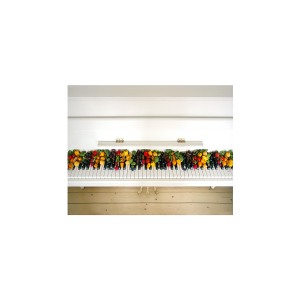
In the ever-growing tower of records for which I’ve written a largely completed but ultimately unpublished review, Julianna Barwick’s The Magic Place ranks near the top. To my credit, I did get my act together to write 50 words for its placement as my favorite album of 2011, but that blurb lacked the real estate to explain my specific application of Barwick’s music. Since no one else will know that I’m repeating myself, allow me to explain it now.
When The Magic Place came out, I was having trouble falling asleep. In a very simple sense, too much was on my mind. I found that listening to a few ambient songs on my headphones was an immense help—I wasn’t falling asleep with earbuds still embedded, but after those songs, I was sufficiently decompressed that I could fall asleep quickly and calmly. The problem was finding the right songs for the task. So many favorites from the genre had caveats: Stars of the Lid’s music gradually accrues a devastating emotional resonance; Tim Hecker’s compositions are rife with tense dichotomies; Grouper offers unsolvable mysteries that are both beautiful and unsettling; too few of Brian Eno’s ambient masterworks resolve within a reasonable timeframe. I got significant mileage from The Dead Texan’s “The Struggle,” Grouper’s “Heavy Water (I’d Rather Be Sleeping),” and Eno’s “An Ending (Ascent),” but The Magic Place shuttled these songs off the decompression playlist.
It took the opposite arc to Stars of the Lid’s And Their Refinement of the Decline; whereas that album’s arrangements turned from polished drones to cutting chord progressions, the looped vocals of The Magic Place transformed from attention-grabbing siren calls to calmly mesmerizing choirs. (This process hasn’t happened for either of Barwick’s first two releases, 2006’s Sanguine and 2009’s Florine, which are worthy practice runs but too reliant upon coloring outside the lines to qualify as relaxing.) “Keep Up the Good Work” started out as the strangest song from The Magic Place, a layered invitation to run my ship aground, but evolved into a supremely comforting swell. After listening to a few tracks from The Magic Place, my mind would arrive at an anxiety-free locale, ready to peacefully drift off to sleep. It was a miraculous, wonderful gift. (It’s worth noting that after my daughter was born, I no longer needed this routine. Lulling ambient music is unnecessary in the presence of sheer exhaustion.)
Since The Magic Place, Julianna Barwick has explored different terrain. The Matrimony Remixes EP offered pleasant but inessential reworkings of “Vow” and “Prizewinning.” She collaborated with Ikue Mori on FRKWYS Vol. 6, which applied her ethereal vocals to glitch electronic compositions; paired with Helado Negro for Ombre’s Believe You Me, contributing as much live instrumentation as vocals to the full-bodied songs; and made worthy guest appearances on Koralleven’s celebratory “Sa Sa Samoa” and Sharon Van Etten’s superlative Tramp. But the “Pacing” b/w “Call” single marks a welcome return to The Magic Place.
It’s not a straight recapitulation of its predecessor’s successes—the fruit-covered piano of the cover image signals the aesthetic shift. “Vow” and “Flown” from The Magic Place utilized piano, but placed it as one piece among more prominent and more plentiful vocal loops. On this single, the reverb-heavy chords take equal footing to the vocal loops on “Pacing” and supplant them entirely on “Call.” It’s strange to hear a Julianna Barwick song devoid of singing, but “Call” finds remarkable depth in its simple lines.
Just like The Magic Place in 2011, no piece of music so far this (admitted young) year has grasped me so thoroughly as “Pacing” b/w “Call.” As long as it took me to elucidate my primary application for Barwick’s music, this single is on constant loop because it works in far more contexts than decompression.
|

